Meet Senator Stan Kutcher

As a leading teen mental health expert, Senator Stan Kutcher has built mental health literacy programs for schools, published more than 400 articles and shared his expertise in more than 20 countries. He’s now trying to bring his research, policy and educational expertise to the Senate. He has also worked to promote better mental health literacy on Parliament Hill.
It’s one of the many causes the Nova Scotia senator has championed since his Red Chamber appointment in 2018. Apart from his legislative and committee work, he has been outspoken about the war in Ukraine, long COVID, climate change, improving Canada’s scientific enterprise — and even his home province’s rich history.
He sits on the Senate Committee on Social Affairs, Science and Technology, the Senate Committee on Fisheries and Oceans and the Special Joint Committee on Medical Assistance in Dying.
How did you develop an interest in teen mental health?
When I was in university, I had the opportunity to work with incarcerated youth at a training school during the summer. These were kids who were convicted of everything from homicide to petty theft. I worked in the recreation department, and I developed a canoe tripping program for the youths. I remember vividly one evening as we were pitching camp, we saw a spectacular sunset.
The kids were saying, “Look at this f---ing sunset. Look at that f---ing sunset.” It occurred to me that they didn’t have any way of expressing or understanding what they were feeling. I became intrigued as to why they lacked that capacity, and I was struck by how that largely differed from kids who weren’t in that facility. That stuck with me.
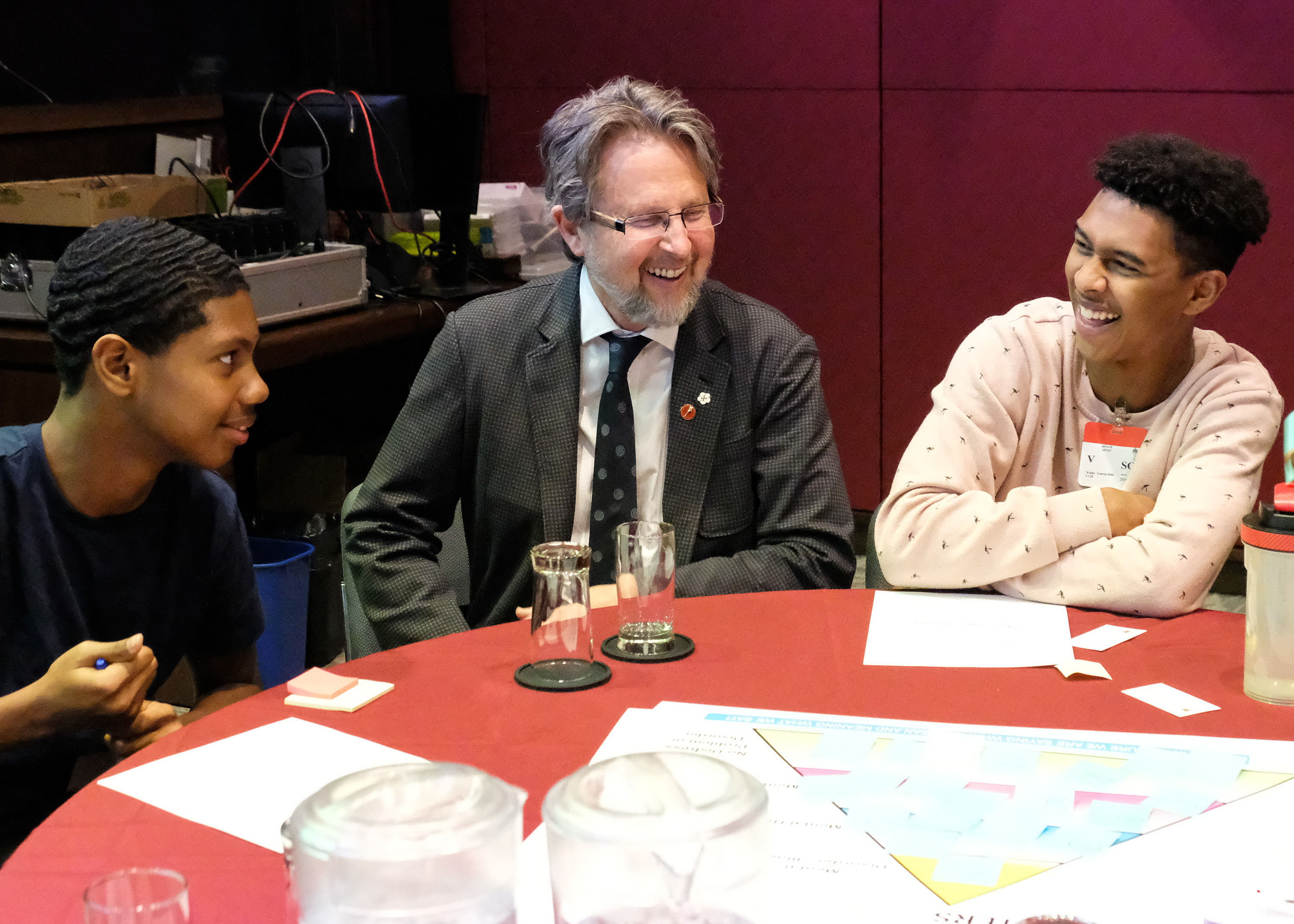
Senator Stan Kutcher meets with youth during a mental health literacy workshop at the Senate of Canada Building in May 2019.
When I started studying psychiatry, I developed a tremendous interest in people’s stories. Instead of approaching my patients as diseases, I approached them as people. The more stories I listened to, the more I realized that the symptoms that eventually turned into a mental illness — whether it was schizophrenia or bipolar or severe depression — all started in adolescence.
From there, I furthered my studies in child and adolescent psychiatry. I studied abroad and when I came back to Canada, I transformed an adolescent unit at Sunnybrook Hospital into a research facility for mental illnesses in kids.
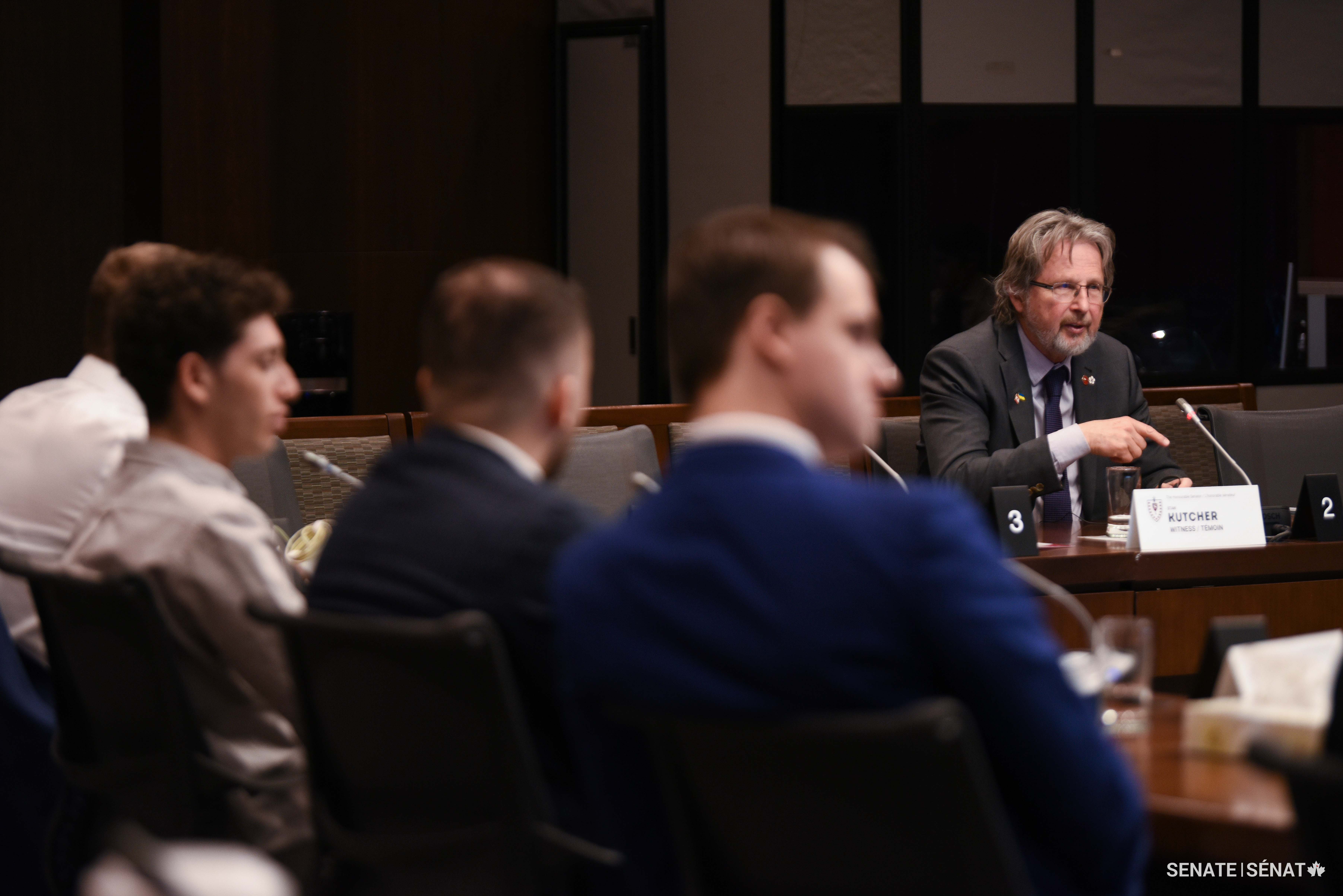
Senator Kutcher appears as a witness before a Model Senate committee meeting in Ottawa on March 10, 2023.
You sit on several Senate committees. Is there any committee or legislative work that stands out to you?
I helped inform amendments on Bill C-83, a prison reform bill, to improve interventions and mental health care for federally incarcerated people. That was full circle to where I started, right in the correctional system.
I also had the privilege of sponsoring Government Bill S-5, the Strengthening Environmental Protection for a Healthier Canada Act. It took a lot of heavy lifting, but I think whatever form it takes, it’s going to be a big step in understanding and ameliorating the impact of environmental toxins on human health.
As a member of the Special Joint Committee on Medical Assistance in Dying, I have also been working on Bill C-39, An Act to amend An Act to amend the Criminal Code (medical assistance in dying). It is my hope that this bill will steer us towards a compassionate understanding of end of life for those who are suffering intolerably, and to treat people with mental illnesses the same way we treat people with other illnesses.
I have also introduced Bill S-251, which would repeal a section of the Criminal Code that permits schoolteachers, parents and caregivers to use physical discipline against a child in their care. I think it’s gobsmacking that Canada would have that on the books.
You participate in a lot of SENgage events, such as Model Senate. How has that experience been for you?
I think it’s an outstanding program. It’s been a privilege to go to schools and talk to kids. They have absolutely no idea what the Senate is.
Some adults don’t know what the Senate is!
That’s what I was going to say! I think we should have SENgage for adult organizations like Rotary clubs, Lions clubs, whatever service club there is in the country. We could reach so many adults who have absolutely no idea what the Senate does or worse, they have a very negative idea of what the Senate does.
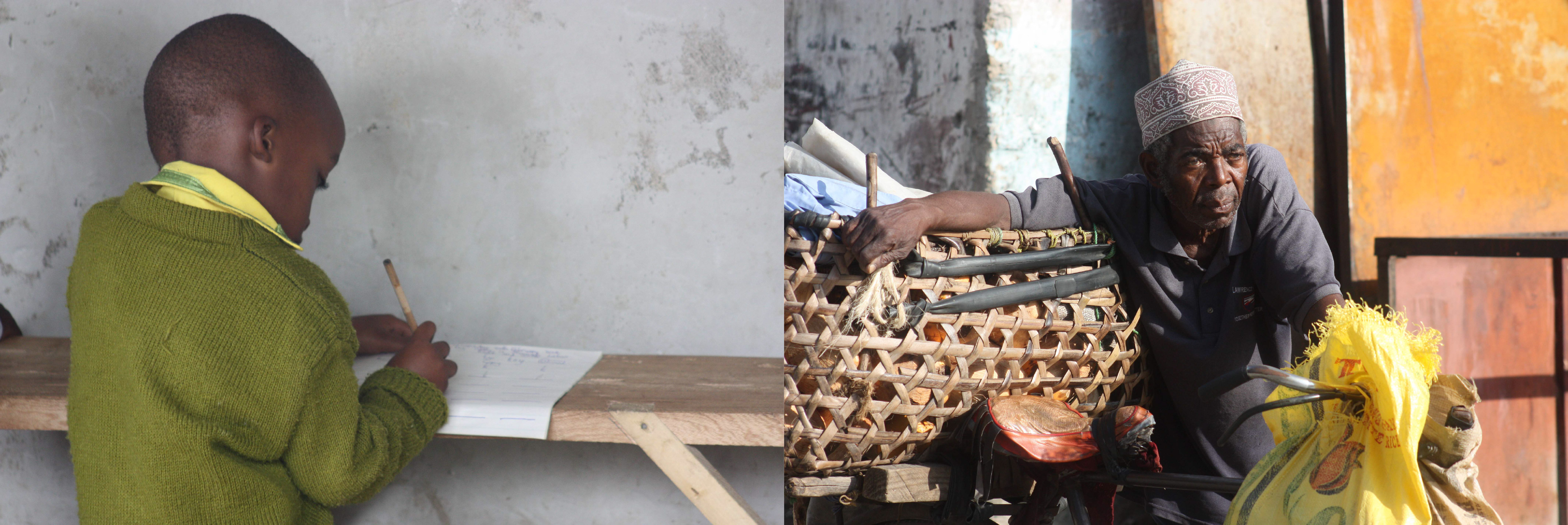
While working on a mental health project in East Africa, Senator Kutcher photographed this boy in Arusha, Tanzania, and this man in Stone Town, Zanzibar. The senator has traveled to more than 20 countries to share his mental health expertise and research. (Photo credits: Office of Senator Stan Kutcher)
You’ve been doing a lot of advocacy work around the war in Ukraine. Your parents were Ukrainian refugees during the Second World War. What part did the Ukrainian culture play in your upbringing?
We didn’t grow up in a Ukrainian community. I learned about my Ukrainian heritage through my parents and grandparents.
Both my parents came from Ukraine, but they met in Canada. They had lost everything. My mother arrived with her parents and her brother at Pier 21 in Halifax. They came with $500 in their pocket and didn’t speak English.
My father arrived by himself. He was in medical school when the war broke out in Ukraine. He was taken by the Germans and somehow survived the war by himself. He lived through the Dresden bombings, which were like what we are seeing in Bakhmut today.
I’ve been doing what I can through the Senate to publicize how important it is for the West to support Ukraine. It’s not just for the sake of Ukraine. Russia is attacking the very values that our democratic system is based on. I’m not the minister of Foreign Affairs or the minister of Defence. I don’t have that kind of power. But I’m trying to promote every support possible for Ukraine.
Are you still in touch with your family there?
We are in touch with some relatives. Others we’ve not been able to contact at all since the invasion. We have no idea what happened to them. Even if I didn’t have family and ties to Ukraine, I would still be doing what I could to speak out so that Canada and other countries would be more supportive.
What’s one thing most Canadians might not know about you?
Apparently, I am a natural at polo. A few years ago, my wife and I went to a polo match at a club in Argentina. Afterwards there was an opportunity to get on a polo pony and try the sport. I wasn’t going to pass that up. I don’t ride horses, but I got on the pony with this polo stick and it was as if I had been doing it my whole life. The instructor said, “You’ve played a lot of polo before.” I said, “I’ve hardly ridden on a horse before!”
You moved to Nova Scotia to become head of the psychiatry department at Dalhousie University. What made you decide to settle there?
The kids loved it. Coming from Toronto, it was such a different way of living. People actually talk to each other on the street.
There’s something about living in the Maritimes where you become part of this bigger whole. It’s hard to put into words. I think you have to be a poet to get it right.
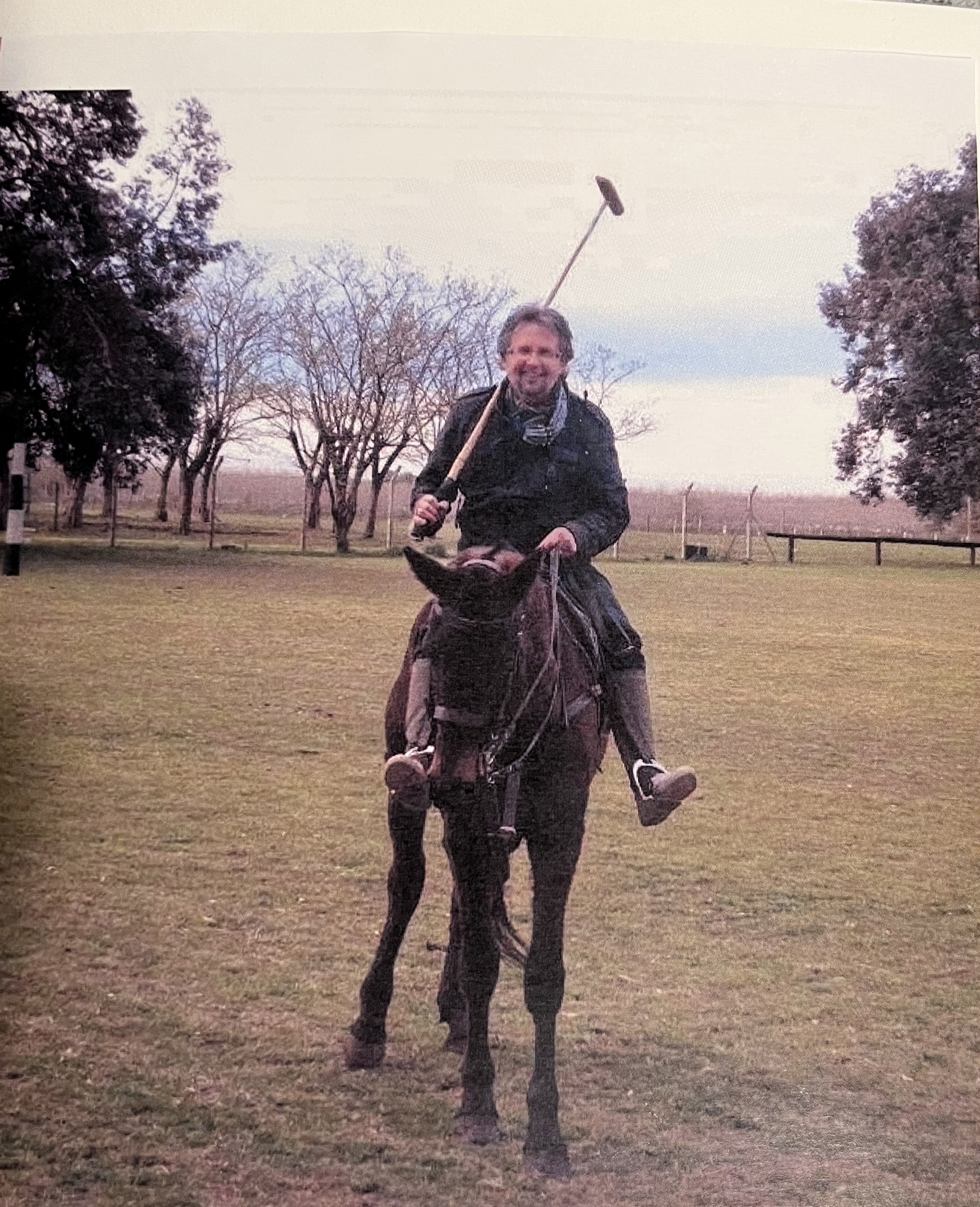
The senator sits astride a polo pony in Argentina.
What’s something that most Canadians should know about Nova Scotia?
Nova Scotia, given its size, punches above its weight in music, culture, science and arts.
A lot of people think Canada ends at Québec City or Montréal. The Atlantic provinces are often an afterthought. Something I’ve tried to do in the Senate is to ensure that committees hear more experts from Atlantic Canada. I would like to see a lot more attention on the incredible things that Nova Scotia — and the whole Atlantic region — can bring to Canada.
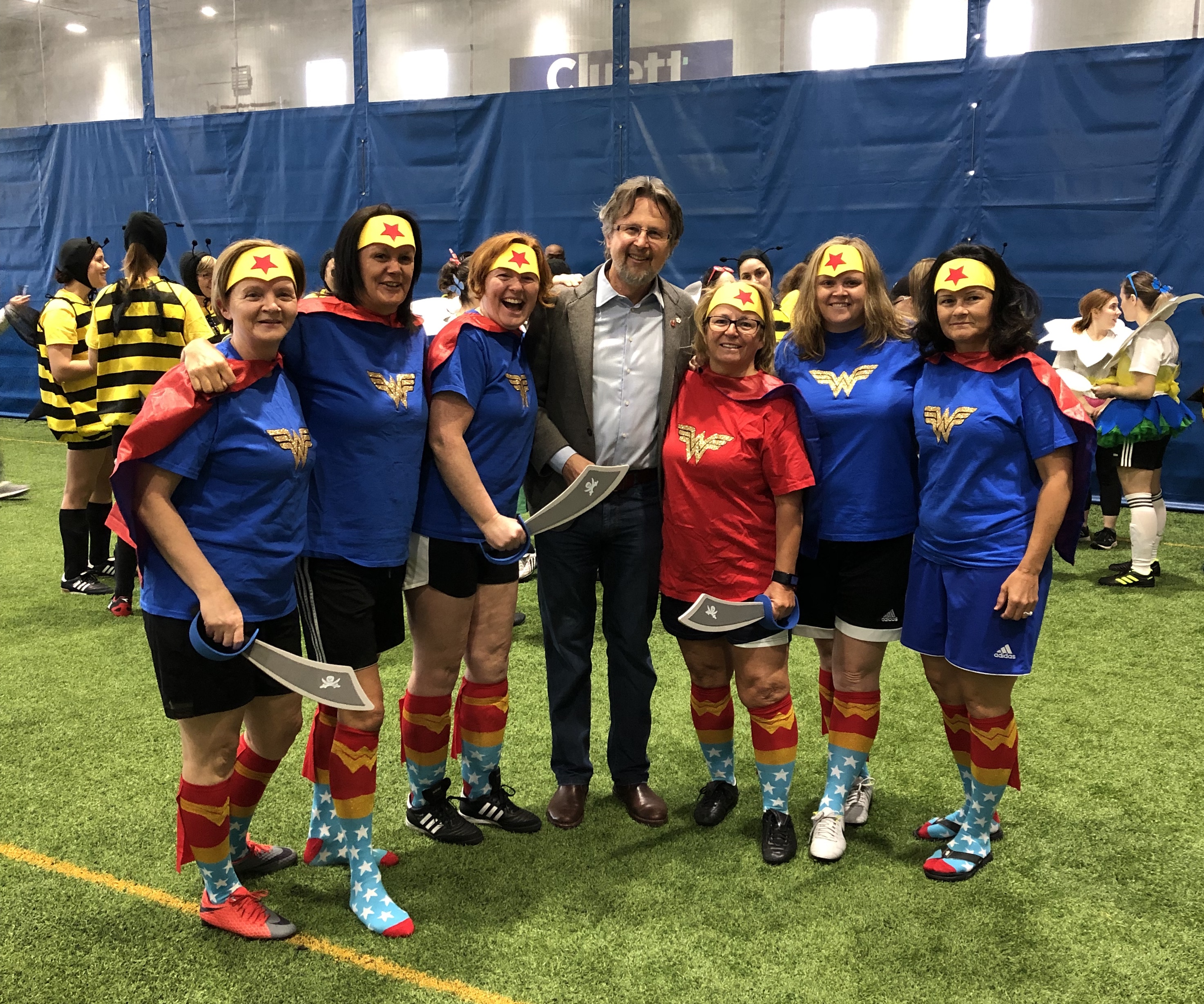
The senator attended the Believe in Hope event in Halifax, Nova Scotia, in April 2019. The event helps support youth who are experiencing serious mental illness.
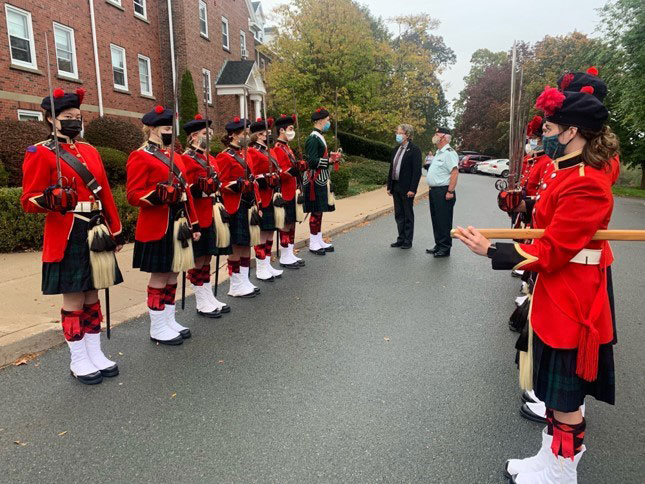
Senator Kutcher meets with students from King’s-Edgehill School’s 254 Cadet Corps in Windsor, Nova Scotia, in October 2021.
Related articles
Tags
Committee news
Meet Senator Stan Kutcher

As a leading teen mental health expert, Senator Stan Kutcher has built mental health literacy programs for schools, published more than 400 articles and shared his expertise in more than 20 countries. He’s now trying to bring his research, policy and educational expertise to the Senate. He has also worked to promote better mental health literacy on Parliament Hill.
It’s one of the many causes the Nova Scotia senator has championed since his Red Chamber appointment in 2018. Apart from his legislative and committee work, he has been outspoken about the war in Ukraine, long COVID, climate change, improving Canada’s scientific enterprise — and even his home province’s rich history.
He sits on the Senate Committee on Social Affairs, Science and Technology, the Senate Committee on Fisheries and Oceans and the Special Joint Committee on Medical Assistance in Dying.
How did you develop an interest in teen mental health?
When I was in university, I had the opportunity to work with incarcerated youth at a training school during the summer. These were kids who were convicted of everything from homicide to petty theft. I worked in the recreation department, and I developed a canoe tripping program for the youths. I remember vividly one evening as we were pitching camp, we saw a spectacular sunset.
The kids were saying, “Look at this f---ing sunset. Look at that f---ing sunset.” It occurred to me that they didn’t have any way of expressing or understanding what they were feeling. I became intrigued as to why they lacked that capacity, and I was struck by how that largely differed from kids who weren’t in that facility. That stuck with me.

Senator Stan Kutcher meets with youth during a mental health literacy workshop at the Senate of Canada Building in May 2019.
When I started studying psychiatry, I developed a tremendous interest in people’s stories. Instead of approaching my patients as diseases, I approached them as people. The more stories I listened to, the more I realized that the symptoms that eventually turned into a mental illness — whether it was schizophrenia or bipolar or severe depression — all started in adolescence.
From there, I furthered my studies in child and adolescent psychiatry. I studied abroad and when I came back to Canada, I transformed an adolescent unit at Sunnybrook Hospital into a research facility for mental illnesses in kids.

Senator Kutcher appears as a witness before a Model Senate committee meeting in Ottawa on March 10, 2023.
You sit on several Senate committees. Is there any committee or legislative work that stands out to you?
I helped inform amendments on Bill C-83, a prison reform bill, to improve interventions and mental health care for federally incarcerated people. That was full circle to where I started, right in the correctional system.
I also had the privilege of sponsoring Government Bill S-5, the Strengthening Environmental Protection for a Healthier Canada Act. It took a lot of heavy lifting, but I think whatever form it takes, it’s going to be a big step in understanding and ameliorating the impact of environmental toxins on human health.
As a member of the Special Joint Committee on Medical Assistance in Dying, I have also been working on Bill C-39, An Act to amend An Act to amend the Criminal Code (medical assistance in dying). It is my hope that this bill will steer us towards a compassionate understanding of end of life for those who are suffering intolerably, and to treat people with mental illnesses the same way we treat people with other illnesses.
I have also introduced Bill S-251, which would repeal a section of the Criminal Code that permits schoolteachers, parents and caregivers to use physical discipline against a child in their care. I think it’s gobsmacking that Canada would have that on the books.
You participate in a lot of SENgage events, such as Model Senate. How has that experience been for you?
I think it’s an outstanding program. It’s been a privilege to go to schools and talk to kids. They have absolutely no idea what the Senate is.
Some adults don’t know what the Senate is!
That’s what I was going to say! I think we should have SENgage for adult organizations like Rotary clubs, Lions clubs, whatever service club there is in the country. We could reach so many adults who have absolutely no idea what the Senate does or worse, they have a very negative idea of what the Senate does.

While working on a mental health project in East Africa, Senator Kutcher photographed this boy in Arusha, Tanzania, and this man in Stone Town, Zanzibar. The senator has traveled to more than 20 countries to share his mental health expertise and research. (Photo credits: Office of Senator Stan Kutcher)
You’ve been doing a lot of advocacy work around the war in Ukraine. Your parents were Ukrainian refugees during the Second World War. What part did the Ukrainian culture play in your upbringing?
We didn’t grow up in a Ukrainian community. I learned about my Ukrainian heritage through my parents and grandparents.
Both my parents came from Ukraine, but they met in Canada. They had lost everything. My mother arrived with her parents and her brother at Pier 21 in Halifax. They came with $500 in their pocket and didn’t speak English.
My father arrived by himself. He was in medical school when the war broke out in Ukraine. He was taken by the Germans and somehow survived the war by himself. He lived through the Dresden bombings, which were like what we are seeing in Bakhmut today.
I’ve been doing what I can through the Senate to publicize how important it is for the West to support Ukraine. It’s not just for the sake of Ukraine. Russia is attacking the very values that our democratic system is based on. I’m not the minister of Foreign Affairs or the minister of Defence. I don’t have that kind of power. But I’m trying to promote every support possible for Ukraine.
Are you still in touch with your family there?
We are in touch with some relatives. Others we’ve not been able to contact at all since the invasion. We have no idea what happened to them. Even if I didn’t have family and ties to Ukraine, I would still be doing what I could to speak out so that Canada and other countries would be more supportive.
What’s one thing most Canadians might not know about you?
Apparently, I am a natural at polo. A few years ago, my wife and I went to a polo match at a club in Argentina. Afterwards there was an opportunity to get on a polo pony and try the sport. I wasn’t going to pass that up. I don’t ride horses, but I got on the pony with this polo stick and it was as if I had been doing it my whole life. The instructor said, “You’ve played a lot of polo before.” I said, “I’ve hardly ridden on a horse before!”
You moved to Nova Scotia to become head of the psychiatry department at Dalhousie University. What made you decide to settle there?
The kids loved it. Coming from Toronto, it was such a different way of living. People actually talk to each other on the street.
There’s something about living in the Maritimes where you become part of this bigger whole. It’s hard to put into words. I think you have to be a poet to get it right.

The senator sits astride a polo pony in Argentina.
What’s something that most Canadians should know about Nova Scotia?
Nova Scotia, given its size, punches above its weight in music, culture, science and arts.
A lot of people think Canada ends at Québec City or Montréal. The Atlantic provinces are often an afterthought. Something I’ve tried to do in the Senate is to ensure that committees hear more experts from Atlantic Canada. I would like to see a lot more attention on the incredible things that Nova Scotia — and the whole Atlantic region — can bring to Canada.

The senator attended the Believe in Hope event in Halifax, Nova Scotia, in April 2019. The event helps support youth who are experiencing serious mental illness.

Senator Kutcher meets with students from King’s-Edgehill School’s 254 Cadet Corps in Windsor, Nova Scotia, in October 2021.


